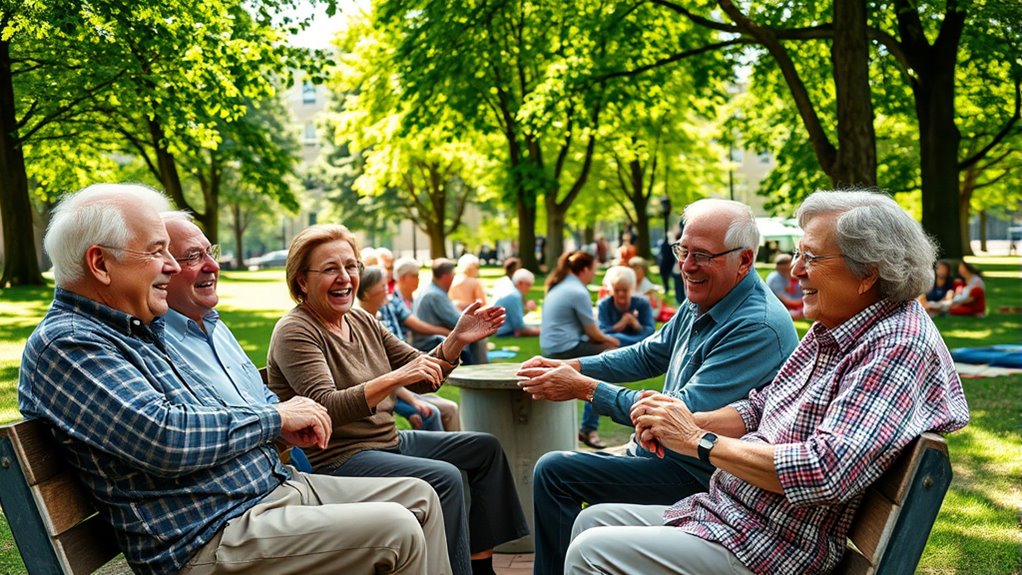Strong social connections are key to living longer and feeling healthier. When you build meaningful relationships, your body releases happiness chemicals that boost your immune system and lower stress. Staying connected with family, friends, or community not only improves your emotional well-being but also reduces risks like heart disease. Prioritizing these bonds helps you face aging with resilience. Keep exploring, and you’ll discover even more ways your social life can support your longevity.
Key Takeaways
- Strong social ties are linked to increased lifespan and reduced risk of chronic diseases.
- Engaging with others releases mood-enhancing chemicals like oxytocin and endorphins, boosting health.
- Social support helps reduce stress, lower inflammation, and improve immune function.
- Regular social interactions promote mental resilience and coping skills during aging.
- Genuine relationships encourage healthy behaviors, such as activity and self-care, contributing to longevity.

Have you ever wondered why some people seem to live longer and healthier lives? The secret often lies in the strength of their social connections. When you’re surrounded by a supportive community, it boosts your emotional well-being, which plays a fundamental role in your overall health and longevity. Community support provides a sense of belonging that makes you feel connected and valued, especially during tough times. This sense of connection isn’t just about having people around; it’s about quality relationships that offer genuine emotional support. When you know someone cares about you, it reduces feelings of loneliness and stress, which are linked to many health issues.
Your emotional well-being benefits considerably from these social bonds. When you engage with others, your brain releases feel-good chemicals like oxytocin and endorphins, which help lessen anxiety and improve your mood. This positive emotional state can enhance your immune system, making it easier for your body to fight off illnesses. Conversely, social isolation can lead to increased stress hormones, inflammation, and a higher risk of cardiovascular disease. That’s why maintaining strong social ties isn’t just a social choice; it’s a health strategy. Feeling connected and supported helps you cope better with life’s challenges, reducing the risk of depression and anxiety, which are known to negatively impact longevity.
Strong social bonds boost mental health and immunity, reducing stress and chronic disease risks.
Building and nurturing social connections doesn’t mean you need a vast network; even small, meaningful relationships can have a powerful impact. Take time to connect with family members, friends, or neighbors regularly. Share your experiences, listen actively, and offer support when they need it. These interactions create a ripple effect that fosters community support and boosts emotional well-being for everyone involved. Participating in community events or groups can also deepen these bonds and provide additional social support networks, which are linked to improved mental and physical health. Engaging in social activities can also encourage the development of self-care practices, which further support overall health and longevity. Developing effective communication skills can also help deepen these connections, making your social interactions more meaningful. Recognizing the importance of social connection in health can motivate you to prioritize these relationships intentionally. Furthermore, creating a welcoming environment at home by incorporating aesthetic home decor solutions can foster a cozy atmosphere that encourages social interaction with visitors and loved ones.
Ultimately, your social life is more than just a source of entertainment or companionship—it’s a essential component of your health. When you prioritize building genuine connections and seek community support, you’re investing in your emotional well-being. This not only enriches your daily life but can also extend it. By staying socially engaged, you’re giving your body and mind the resilience needed to face aging and health challenges, making longevity more achievable. So, don’t underestimate the power of a kind word, a shared laugh, or simply being there for someone; these small acts can have a lasting impact on your health and lifespan.
Frequently Asked Questions
How Do Different Types of Social Relationships Influence Lifespan?
Different types of social relationships influence your lifespan through social bonding and emotional support. Close family ties offer a strong sense of security, while friendships provide emotional comfort and reduce stress. Supporting networks help you cope with challenges, boosting your resilience. Engaging with diverse social connections fosters a sense of belonging, which research links to longer, healthier life. Building and maintaining these relationships is essential for promoting overall well-being and longevity.
Can Online Social Interactions Replace In-Person Connections for Longevity Benefits?
Think of virtual friendships as bridges spanning a river—they connect you across distances. While online support offers comfort and companionship, it can’t fully replace in-person connections for longevity benefits. You might find emotional warmth through virtual interactions, but physical presence and face-to-face contact often hold the key to deeper bonds. So, keep building both virtual and real-world relationships to nurture your health and well-being.
What Role Does Community Engagement Play in Increasing Lifespan?
Community engagement plays a vital role in increasing your lifespan. When you participate in volunteer work, you foster meaningful social bonds and a sense of purpose that boost your well-being. Cultural participation, like attending events or workshops, keeps your mind active and connected to others. These activities reduce stress and promote a sense of belonging, which research shows can substantially enhance your longevity. So, staying involved benefits both your heart and your overall health.
How Does Social Isolation Affect Mental Health and Longevity?
Imagine feeling lonely in a crowded room—that’s how social isolation can harm your mental health and longevity. Without social support, your emotional well-being suffers, increasing risks of depression and stress. Over time, this strain can lead to health issues that shorten your lifespan. Staying connected provides essential emotional support, boosting your mental resilience and helping you live longer and healthier. Don’t underestimate the power of relationships for your well-being.
Are There Specific Social Behaviors Linked to Longer Life Expectancy?
You can boost your lifespan by engaging in social behaviors like offering emotional support and participating in shared activities. When you connect emotionally with others, you foster trust and reduce stress, which benefits your health. Sharing activities such as hobbies or group exercises not only strengthen bonds but also keep you active and engaged. These behaviors contribute to a longer, healthier life by enhancing your social network and emotional well-being.
Conclusion
Building strong social connections is like nurturing a garden—you’ll see your health flourish and your years multiply. When you stay connected with loved ones and community, you create a safety net that catches you through life’s storms. Remember, you’re not an island; your relationships are the bridges that carry you toward a longer, happier life. So, make time for those bonds—they’re the secret ingredients to living not just longer, but better.









